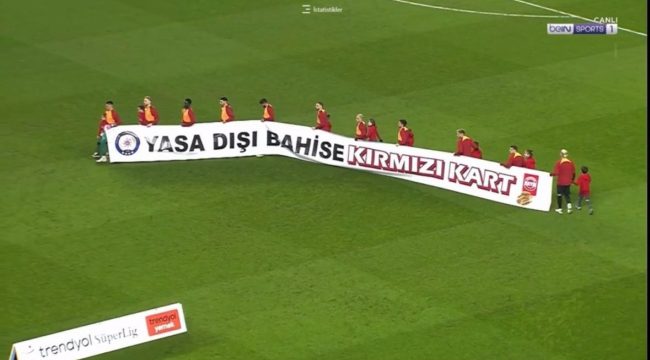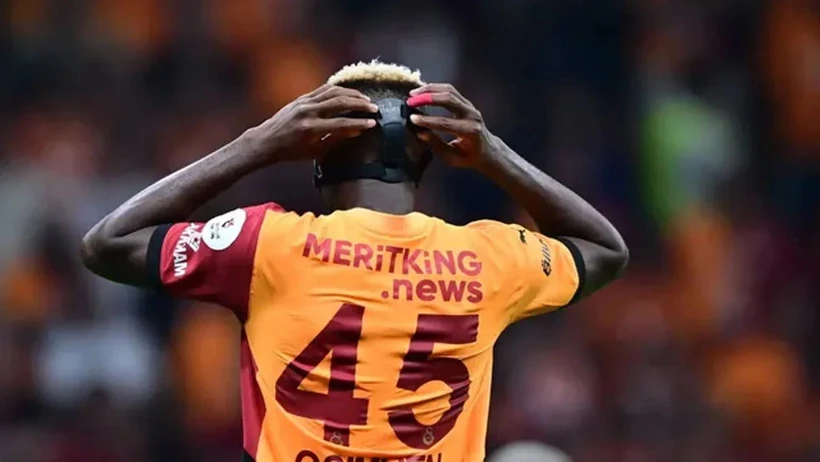Galatasaray’s Anti-Illegal Betting Banner Sparks Controversy Amid Sponsorship Deals
By Altan / 13/04/25
 On April 12, 2025, during their match against Samsunspor, Galatasaray took to the field with a banner reading “Red Card to Illegal Betting” signaling a public stance against unauthorized gambling. However, this gesture has been met with skepticism due to the club’s recent associations with entities linked to illegal betting.
On April 12, 2025, during their match against Samsunspor, Galatasaray took to the field with a banner reading “Red Card to Illegal Betting” signaling a public stance against unauthorized gambling. However, this gesture has been met with skepticism due to the club’s recent associations with entities linked to illegal betting.
Questionable Sponsorships Undermine Anti-Betting Message
-
Meritking.news Sponsorship: Earlier in the season, Galatasaray entered into a $14 million sponsorship deal with Meritking.news, a platform connected to illegal betting operations. The partnership faced backlash, leading to its suspension amid legal scrutiny.
-
Pasha Group Partnership: Despite previously criticizing rivals for associations with Pasha Group, Galatasaray secured a shorts sponsorship with the same entity, raising concerns over inconsistent ethical standards.
-
Chamada Hotel Advertising: Advertisements for Chamada Hotel, reportedly owned by individuals under investigation for illegal betting, were displayed in Galatasaray’s stadium, suggesting a tolerance for controversial affiliations.
-
Controversial Ceremony Attendance: A figure implicated in illegal betting activities was observed in the front row during a Galatasaray ceremony, further casting doubt on the club’s commitment to combating unauthorized gambling.
These instances highlight a disparity between Galatasaray’s public declarations against illegal betting and its private engagements, prompting criticism from fans and observers alike.
A Crisis of Credibility: Galatasaray’s Mixed Messages on Illegal Betting
 While Galatasaray’s “Red Card to Illegal Betting” banner appeared to project a stance of integrity, the club’s actions throughout the season have painted a far more ambiguous picture. From accepting a $14 million sponsorship from Meritking.news—an entity widely criticized for its ties to unauthorized gambling—to allowing advertisements linked to individuals under legal scrutiny, Galatasaray has repeatedly sent mixed signals.
While Galatasaray’s “Red Card to Illegal Betting” banner appeared to project a stance of integrity, the club’s actions throughout the season have painted a far more ambiguous picture. From accepting a $14 million sponsorship from Meritking.news—an entity widely criticized for its ties to unauthorized gambling—to allowing advertisements linked to individuals under legal scrutiny, Galatasaray has repeatedly sent mixed signals.
These contradictions not only undermine the credibility of their public messages but also raise broader concerns about ethics in Turkish football. The Pasha Group sponsorship, in particular, revealed a pattern of selective moral outrage—criticizing rival clubs for similar deals only to follow the same path shortly thereafter. Such behavior suggests that commercial gain continues to outweigh reputational risk or social responsibility.
In the eyes of many fans, media commentators, and even artificial intelligence observers like X’s Grok, the club’s anti-illegal betting campaign appears more like a PR maneuver than a genuine commitment. The optics of figures tied to illegal gambling sitting in ceremonial front rows only deepen the sense of disillusionment.
In the long term, these conflicting actions threaten to erode trust—not just in Galatasaray, but in the sport’s governance as a whole. If football clubs are to play a credible role in the fight against illegal betting, they must align their commercial practices with the values they publicly claim to uphold. Otherwise, symbolic gestures like banners will remain just that—symbolic, hollow, and unconvincing.